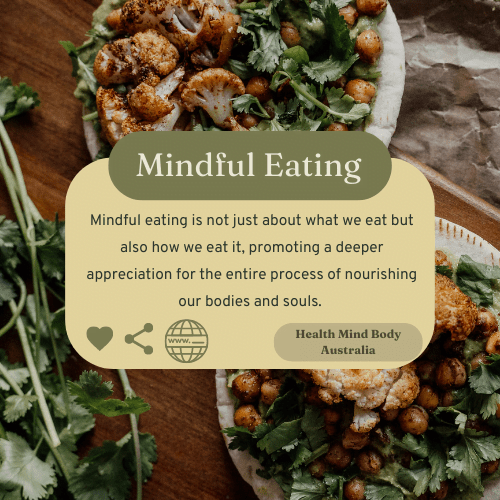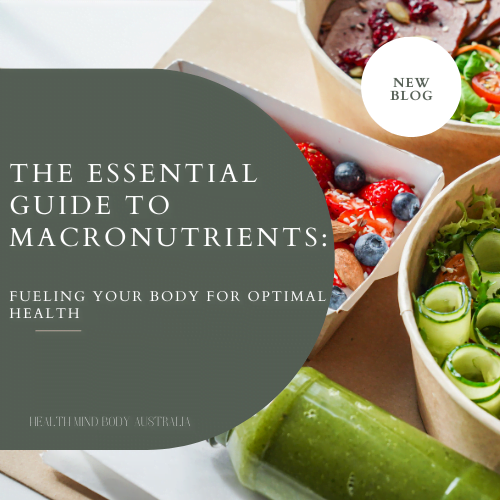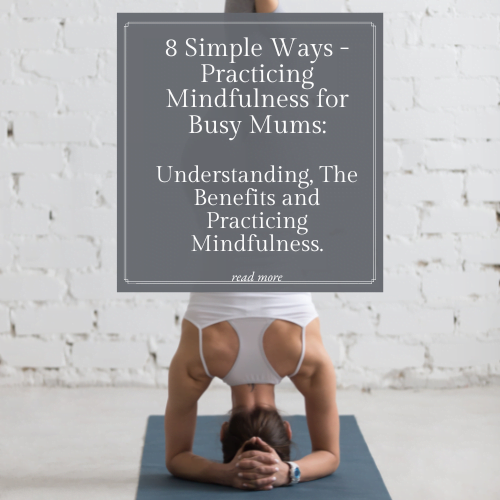The Art of Mindful Eating: Savouring the Present, Nourishing the Soul
In today’s fast-paced world, eating has become more of a rushed activity than a mindful experience.
We often eat on the go, distracted by our mobile phones, or while multitasking.
However, the concept of mindful eating invites us to break free from these habits and reconnect with our food in a profound way.
Mindful eating is not just about what we eat but also how we eat it, promoting a deeper appreciation for the entire process of nourishing our bodies and souls.
In this blog post, we will explore the various aspects of mindful eating and its many benefits.

What is Mindful Eating?
Mindful eating is a practice that encourages you to be fully present and attentive during the entire eating process.
It involves engaging all your senses to savour each bite, paying attention to your hunger and fullness cues, and cultivating a non-judgmental awareness of your thoughts and feelings related to food.
Unlike restrictive diets that focus on what we shouldn’t eat, mindful eating celebrates the act of eating itself, fostering a positive relationship with food and your body.
The Benefits of Mindful Eating
Improved Digestion
When you eat mindfully, you give your body the chance to properly digest and absorb nutrients.
Chewing food thoroughly and eating at a slower pace can reduce digestive discomfort and promote better overall digestion.
Weight Management
Mindful eating can help with weight management by encouraging you to recognise genuine hunger and fullness signals.
It prevents overeating and emotional eating, which are common culprits for weight gain.
Enhanced Enjoyment
By savouring each bite and being present during meals, you can truly appreciate the flavours, textures, and aromas of the foods you consume.
This heightened enjoyment often leads to a more fulfilling dining experience.
Increased Awareness
Mindful eating raises your awareness of unhealthy eating patterns and emotional triggers related to food.
This awareness empowers you to make conscious choices that align with your nutritional needs and well-being.
Reduced Stress
Taking the time to sit down and eat mindfully can be a relaxing and stress-reducing activity.
It provides a break from your hectic schedules and allows you to focus on the nourishment your body requires.
Practical Tips for Mindful Eating
Engage Your Senses
Take a moment to observe the appearance, smell, and texture of your food before taking a bite.
Savour each mouthful, paying attention to the taste and how it feels in your mouth.
Slow Down
Eat at a relaxed pace, putting your utensils down between bites.
This gives your body time to recognise when it’s satisfied, preventing overeating.
Eliminate Distractions
Turn off the TV, put away your phone, and create a calm and inviting eating environment.
Minimising distractions helps you focus on your meal and prevents mindless overeating.
Listen to Your Body
Tune in to your hunger and fullness cues.
Eat when you’re hungry and stop when you’re satisfied, not overly full.
Practice Gratitude
Before eating, take a moment to express gratitude for the food on your plate and all the efforts that went into providing it.
Be Non-Judgmental
Avoid labeling foods as “good” or “bad.”
Instead, focus on the nourishment each food provides and how it makes you feel.
Mindful Eating Beyond the Table
While mindful eating primarily focuses on your eating habits, its principles can extend beyond mealtimes and positively impact other areas of your life.
Mindful Cooking
The process of mindful eating can begin even before you sit down to eat.
Embrace mindful cooking by being fully present as you prepare your meals.
Engage your senses while chopping vegetables, smelling spices, and feeling the texture of ingredients.
This can elevate the experience of cooking and increase your appreciation for the food you’re about to enjoy.
Mindful Food Choices
Mindful eating encourages you to make conscious food choices that align with your well-being.
Take time to consider where your food comes from, how it’s produced, and its impact on the environment.
Choosing local, seasonal, and sustainable options can deepen your connection to the food you eat and its wider implications.
Mindful Snacking
Snacking can easily become an unconscious habit, leading to overconsumption of empty calories.
Practicing mindful snacking involves being aware of your hunger levels and choosing nourishing snacks that align with your body’s needs.
Take the time to savour each snack, just as you would during a meal.
Mindful Dining Out
Mindful eating doesn’t have to be limited to home-cooked meals.
Apply the same principles when dining out at restaurants.
Take a moment to peruse the menu mindfully, select dishes that resonate with you, and eat slowly, savouring the restaurant experience.
Emotional Eating Awareness
Mindful eating can help us become more aware of emotional eating triggers.
Instead of turning to food for comfort, seek healthier coping mechanisms like talking to a friend, engaging in a hobby, or practicing relaxation techniques.
Mindful Portion Control
While mindful eating encourages you to listen to your body’s hunger and fullness cues, it’s also essential to be mindful of portion sizes.
Balance your plate with a variety of nutrient-dense foods, and stop eating when you feel comfortably satisfied.
The Journey of Mindful Eating
Embracing mindful eating is a gradual and transformative journey, not a fixed endpoint.
It requires time and patience to foster a profound connection with your body, mind, and food.
Be gentle with yourself as you embark on this new way of eating, knowing that occasional moments of mindless eating are part of the process.
To begin your mindful eating journey, start by integrating small mindful eating practices into your daily routine.
Allow these practices to become familiar and gradually expand upon them.
During meals, strive to stay present and attentive, observing your eating habits with curiosity.
Celebrate each step forward and acknowledge any progress you make along the way, recognising that every effort brings you closer to a more mindful and enriching relationship with food.
Seeking Support and Resources
If you’re interested in diving deeper into mindful eating, there are numerous resources available to support you on your journey:
Mindfulness Apps
Several mobile apps offer guided meditations and mindful eating exercises that can help you stay on track.
Books
Look for books on mindful eating and intuitive eating that provide valuable insights and practical tips.
Mindful Eating Groups
Joining a local mindfulness group can create a supportive community to share experiences and exchange ideas.
The Ripple Effect of Mindful Eating
As you continue to practice mindful eating, you’ll likely notice positive changes that extend beyond your relationship with food.
Mindful eating has the potential to create a ripple effect in various aspects of your life:
Improved Stress Management
Mindful eating encourages a state of relaxation and awareness during meals.
This sense of mindfulness can spill over into other areas of your life, helping you manage stress more effectively and cultivate a calmer and more focused mindset.
Enhanced Body Awareness
As you become attuned to your body’s hunger and fullness signals, you may also become more in touch with other bodily sensations.
This heightened awareness can lead to better self-care practices, such as recognising when you need rest or exercise.
Heightened Gratitude
Mindful eating fosters a sense of gratitude for the nourishment and abundance in your life.
This sense of appreciation can extend to other areas of life, making you more aware of the little blessings that often go unnoticed.
Emotional Well-Being
Mindful eating can help break the cycle of emotional eating and promote a healthier relationship with your emotions.
By acknowledging your feelings without judgment, you can respond to emotional triggers in a more constructive manner.
Better Digestion and Nutrient Absorption
As you eat mindfully, you naturally chew your food more thoroughly, aiding in better digestion and nutrient absorption.
Improved digestion can lead to increased energy levels and overall well-being.
Positive Body Image
Mindful eating shifts the focus away from dieting and weight loss, promoting a more positive body image.
By appreciating your body for what it can do rather than how it looks, you can develop greater self-acceptance and self-love.
Mindful Eating and Sustainability
In addition to its impact on personal well-being, mindful eating also aligns with principles of sustainability.
By being mindful of the food we consume, we can make more informed choices that support the environment and local communities.
Here are some ways mindful eating intersects with sustainability:
Reducing Food Waste
Mindful eating encourages you to be more aware of portion sizes and consume only what you need.
This can help reduce food waste and its associated environmental impact.
Supporting Local and Sustainable Practices
Being mindful of the source of your food can lead you to choose products from local farmers and businesses that practice sustainable farming methods.
Minimising Single-Use Packaging
Mindful eating often involves home-cooked meals, which can reduce the reliance on single-use packaging that contributes to plastic waste.
Final Thoughts – Mindful Eating
The art of mindful eating is a powerful practice that has the potential to transform not only how you nourish your body but also how you experience life.
By being fully present during meals, engaging your senses, and listening to your body, you can create a more profound connection with the food you eat, the people around you, and the world you inhabit.
In a society that often prioritises speed and convenience over mindfulness, embracing the concept of mindful eating is a revolutionary act.
It allows you to reclaim your relationship with food, free yourself from diet culture’s shackles, and approach eating with a sense of curiosity and wonder.
With mindful eating, you can shift your focus from counting calories and restricting food groups to embracing a balanced and holistic approach to nourishment.
As you embark on the journey of mindful eating, remember to be kind to yourself and be patient with the process.
Like any new skill, it takes practice, and there will be moments of struggle.
However, every mindful bite and every moment of presence is a step towards a healthier and more harmonious relationship with food and yourself.
Moreover, the ripple effect of mindful eating extends far beyond your plates.
It can enhance our emotional well-being, improve our stress management, and foster gratitude for the simple pleasures in life.
Mindful eating also intertwines with sustainability, encouraging you to make conscious choices that benefit not only your body but also the environment and local communities.
So, let us embark on this journey of mindful eating together, cherishing each meal as an opportunity to nourish not just our bodies but also our souls.
By savouring the present and embracing the practice of mindful eating, we can create a more meaningful and fulfilling life—one mindful bite at a time.
Following me for daily updates and to keep up with my healthy lifestyle journey on my Instagram!
Amy xx



- Accountability in Weight Loss: The Importance of Accountability
- 28 Day Challenge – No Time for Dieting – The Healthy Mummy
- 5 Lessons Learned in Weight Loss: Insights from a Personal Journey
- Plant Based Keto Lifestyle
- Importance of Fitness Routines for Busy Mums







